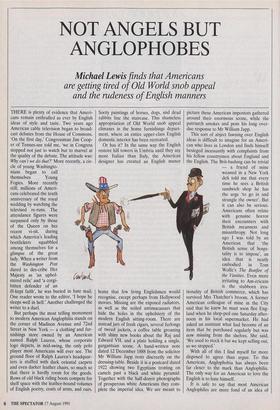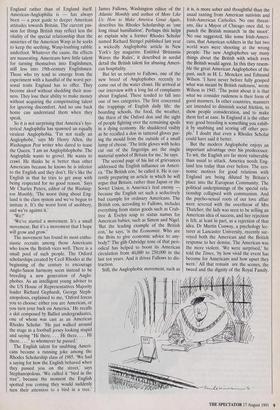NOT ANGELS BUT ANGLOPHOBES
Michael Lewis finds that Americans
are getting tired of Old World snob appeal and the rudeness of English manners
THERE is plenty of evidence that Ameri- cans remain enthralled as ever by English ideas of style and taste. Two years ago American cable television began to broad- cast debates from the House of Commons. 'On the first day,' Congressman Jim Coop- er of Tennes-see told me, 'we in Congress stopped not just to watch but to marvel at the quality of the debate. The attitude was: Why can't we do that?' More recently, a cir- cle of young Washingto- nians began to call themselves Young Fogies. More recently still, millions of Ameri- cans celebrated the tenth anniversary of the royal wedding by watching the televised re-runs. The attendance figures were surpassed only by those of the Queen on her recent vi-sit, during which America's leading bootlickers squabbled among themselves for a glimpse of the great lady. When a writer from the Washington Post dared to des-cribe Her Majesty as 'an uphol- stered relic' and 'a corgi- bitten defender of an ill-kept faith', he was buried in hate mail. One reader wrote to the editor, 'I hope he sleeps well in hell.' Another challenged the writer to a duel.
But perhaps the most telling monument to modern American Anglophilia stands on the corner of Madison Avenue and 72nd Street in New York — a clothing' and fur- nishings store owned by an American named Ralph Lauren, whose corporate logo depicts, in mid-swing, the only polo player most Americans will ever see. The ground floor of Ralph Lauren's headquar- ters is stuffed with dark oriental carpets and even darker leather chairs, so much so that there is hardly room for the goods. Rows of old black riding boots compete for shelf space with the leather-bound volumes of English poetry, coats of arms, and oars. Sooty paintings of horses, dogs, and dead rabbits line the staircase. This shameless appropriation of Old World snob appeal climaxes in the home furnishings depart- ment, where an entire upper-class English domestic interior has been recreated.
Or has it? In the same way the English restore hill towers in Umbria until they arp more Italian than Italy, the American designer has created an English manor home that few living Englishmen would recognise, except perhaps from Hollywood movies. Missing are the exposed radiators, as well as the soiled antimacassars that hide the holes in the upholstery of the modern English sitting-room. There are instead jars of fresh cigars, several furlongs of tweed jackets, a coffee table groaning with shiny new books about the Raj and Edward VII, and a plate holding a single, gargantuan scone. A hand-written note dated 12 December 1888 from the solicitor Mr William Japp rests discreetly on the dressing-table. Beside it is a postcard dated 1922 showing two Egyptians trotting on camels past a black and white pyramid. Together with the half-dozen photographs of prosperous white Americans they com- plete the imperial idea. We are meant to picture these American impostors gathered around their enormous scone, while the patriarch smokes and pens his long over- due response to Mr William Japp.
With all of this I find myself far more disposed to agree than argue. To this American, Anglophobia has always been far closer to the mark than Anglophilia. The only way for an American to love the English is to hate himself.
It is safe to say that most American Anglophiles are more fond of an idea of
England rather than of England itself, American-Anglophilia is — has always been — a poor guide to deeper American attitudes towards Britain. The current pas- sion for things British may reflect less the vitality of the special relationship than the anxieties of the American Wasp as he seeks to keep the seething, Wasp-loathing rabble underfoot. Whatever the cause, the effects are nauseating. Americans have little talent for turning themselves into Englishmen, still less into 19th-century Englishmen. Those who try tend to emerge from the experiment with a handful of the worst per- sonal traits England has to offer. They become aloof without shedding their nosi- ness. They lose their ability to make money without acquiring the compensating talent for ignoring discomfort. And no one back home can understand them when they speak.
So it is not surprising that America's hys- terical Anglophilia has spawned an equally virulent Anglophobia. I'm not really an Anglophobe,' says Mr Henry Allen, the Washington Post writer who dared to tease the Queen. 'I am an Anglophilophobe. The Anglophile wants to grovel. He wants to crawl He thinks he is better than other Americans because he knows he is inferior to the English and they don't. He's like the English in that he tries to get away with being respected for no good reason.' Says Mr Charles Peters, editor of the Washing- ton Monthly, 'The worst thing about Eng- land is the class system and we've begun to imitate it. It's the worst form of snobbery, and we're against it.'
'We?'
'We've started a movement. It's a small movement. But it's a movement that I hope will grow and grow.'
The movement has found its most enthu- siastic recruits among those Americans who know the British vices well. There is a small pool of such people. The Oxford scholarships created by Cecil Rhodes at the beginning of the century to encourage Anglo-Saxon harmony seem instead to be breeding a new generation of Anglo- phobes. As an intelligent young adviser to the US House of Representatives Majority leader Richard Gephardt, George Steph- anopolous, explained to me, 'Oxford forces you to choose: either you are American, or you turn your back on America.' He recalls a skit composed by Balliol undergraduates, one of whom was cast as an American Rhodes Scholar. 'He just walked around the stage in a football jersey looking stupid and saying "Hi there. . .. Hi there. ... Hi there. . . ."_to whomever he passed.'
The English talent for snubbing Ameri- cans became a running joke among the Rhodes Scholarship class of 1985. 'We had a saying for how the English behaved when they passed you on the street,' says Stephanopolous. 'We called it "bird in the tree", because the moment the English spotted you coming they would suddenly turn their attention to a bird in a tree.' James Follows, Washington editor of the Atlantic Monthly and author of More Like Us: How to Make America Great Again, describes his Rhodes Scholarship as 'one long ritual humiliation'. Perhaps this helps to explain why a former Rhodes Scholar named Richard Stengel published last year a wickedly Anglophobic article in New York's Spy magazine. Entitled 'Britannia Waves the Rules', it described in sordid detail the British talent for abusing Ameri- can hospitality.
But let us return to Follows, one of the new breed of Anglophobes recently to come out of the water closet. He arrived at our interview with a long list of complaints about England. These tended to fall into one of two categories. The first concerned the trappings of English daily life: the boarding schools, the food, the weather, the thirst of the Oxford don and the sight of people fighting over the remaining spoils in a dying economy. He shuddered visibly as he recalled a don in tattered gloves par- ing the mould from the outside of a small lump of cheese. 'The little gloves with holes cut out of the fingertips are the single material symbol of Britain for me,' he says.
The second page of his list of grievances addressed the English influence on Ameri- ca. 'The British con,' he called it. He is cur- rently preparing an article in which he will argue that Britain, rather than Japan or the Soviet Union, is America's real enemy — because the English set such a seductively bad example for ordinary Americans. The British con, according to Follows, includes everything from status goods such as Crab- tree & Evelyn soap to status names for American babies, such as Simon and Nigel. 'But the leading example of the British con,' he says, is the Economist. Who are the Brits to give economic advice to any- body?' The glib Oxbridge tone of that peri- odical has helped to boost its American circulation from 40,000 to 250,000 in the last ten years. And it drives Follows to dis- traction.
Still, the Anglophobic movement, such as it is, is more sober and thoughtful than the usual ranting from American nativists and Irish-American Catholics. No one threat ens, like a Mayor of Chicago once did, to punch the British monarch in the snoot'. No one suggested, like some Irish-Ameri- cans, that American soldiers in the last two world wars were shooting at the wrong people. The new Anglophobes say many things about the British with which even the British would agree. In this they resem- ble the great American Anglophobes of the past, such as H. L. Mencken and Edmund Wilson. 'I have never before fully grasped what was meant by British rudeness,' wrote Wilson in 1945. 'The point about it is that what we consider rudeness is their form of good manners. In other countries, manners are intended to diminish social friction, to show people consideration, and to make them feel at ease. In England it is the other way: good breeding is something you exhib- it by snubbing and scoring off other peo- ple.' I doubt that even a Rhodes Scholar could have said it better.
But the modern Anglophobe enjoys an important advantage over his predecessor. To wit, the English are far more vulnerable than usual to attack. America needs Eng- land less today than ever before. The eco- nomic motives for good relations with England are being diluted by Britain's place into the European Community. The political underpinnings of the special rela- tionship collapsed with communism. And the psycho-sexual roots of our love affair were severed with the overthrow of Mrs Thatcher; the lady was seen to be selling an American idea of success, and her rejection is felt, at least in part, as a rejection of that idea. Dr Martin Conway, a psychology lec- turer at Lancaster University, recently sur- veyed both the American and the British response to her demise. The American was the more violent. 'We were surprised,' he told the Times, `by how vivid the event has become for Americans and how upset they were.' All that remain are the scones, the tweed and the dignity of the Royal Family.



















































 Previous page
Previous page